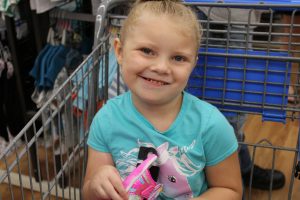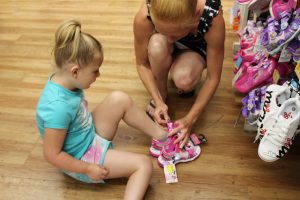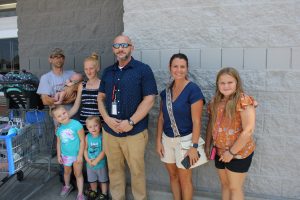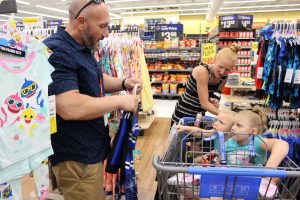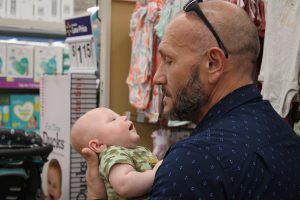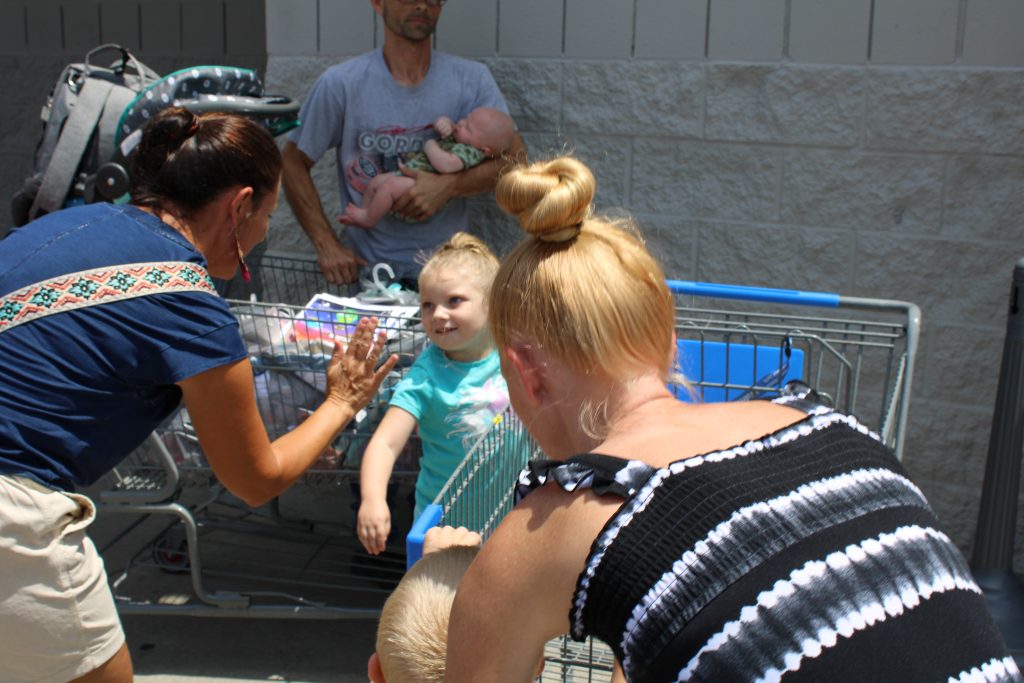DSCC Families, We Want Your Feedback!

Our annual family survey is an easy way to share your input and help improve our services.
Attention participant families, be sure to watch your mail or email!
On Feb. 10, all Division of Specialized Care for Children (DSCC) participants will receive our annual family survey.
This survey asks how well our team members support your family and meet your needs. It also asks about:
- Your contact preferences
- How and when you’d like to meet with our team
- How well our staff communicates with you
You will receive this survey by email or mail, based on your preferences. If you respond, you could win one of five $50 Amazon gift cards.*
Your responses will help us strengthen your services. They also guide updates to our DSCC policies and procedures that affect your family.
Our surveys are optional, but we strongly encourage you to share your experiences. We want to ensure we’re doing all we can to help you meet your family’s needs and achieve your goals.
* Please note: Foreign national nonresident aliens are not eligible for the gift card participation prize.
How Your Feedback Makes a Difference
Your ideas and feedback help improve our services to families like yours. We used family input from last year’s survey to:
- Train our care coordination teams to better understand the family perspective and tailor services to your unique needs and wants.
- Educate families about the benefits of our DSCC Family Portal to easily communicate and share information with your care coordination team.
- Launch NurseNet, a new online tool to help families connect with available in-home nurses.
- Offer free webinars on important health insurance topics affecting families.
- Improve our language access to better support our families’ diverse backgrounds.
- Reorganize our Chicago offices to better serve the Chicago community.
Please be on the lookout for our annual survey on Feb. 10.
If you have questions or need more information, please contact your Care Coordinator.
We appreciate your partnership and look forward to hearing from you!
Mokena Care Coordinator Earns DSCC’s Award of Merit

DSCC honors Meeka Hudson for her dedication to supporting Illinois children and youth with special healthcare needs and their families
Care Coordinator Meeka Hudson is the 2024 recipient of the University of Illinois Chicago’s Division of Specialized Care for Children (DSCC) Award of Merit.
The award recognizes exceptional employees for outstanding dedication and service to Illinois children with special healthcare needs and their families.
Meeka is a Care Coordinator in the Mokena Regional Office. She joined the Core Program team in 2018 and has played an invaluable role in empowering families ever since.
“Meeka is an exceptional Care Coordinator with a passion for helping her participant families navigate difficult situations and finding ways to reduce stress in their lives,” DSCC Executive Director Thomas F. Jerkovitz said.
“Her teammates praise her dedication, knowledge of resources and willingness to help. Meeka has also been instrumental in developing valuable education and networking opportunities for families based at the Mokena office.”
Meeka’s colleagues in the Mokena office nominated her for the award, noting her positive influence, expertise, compassion and creativity.
“Meeka’s dedication to her role is evident in everything she does,” Mokena Assistant Regional Manager Tami L. Peleckis said. “She is always ready to lend a hand, provide guidance, and share her expertise with her colleagues. Her positive attitude and willingness to go the extra mile make her an indispensable asset to our team.”
Program Coordinator Assistant Leslie Leske-Ely praised Meeka’s ability to break down information into manageable steps and empower families to take charge of their situations.

“She provides positive and innovating contributions to our office. Her ideas help in improving our office morale and family engagement,” Bilingual Care Coordinator Ana Lule said. “Meeka consistently goes above and beyond to ensure that families receive the support and resources they need. She approaches every case with empathy and a genuine desire to make a positive impact.”
Mokena Regional Manager Deanna Deleshe has worked with Meeka since she started at DSCC. When Meeka’s participant families wanted a space to network with other families in their same situation, Meeka saw a need and shared an idea with Deanna.
“Meeka was the inspiration behind our pilot of the Mokena Family Networking and Education Group called the Mokena Connection,” Deanna said. “Meeka also, along with other team members, was the inspiration behind all of our in-person office events (for participant families). We do our Winter Wonderland, our Spring Fling, our Summer Extravaganza and our Trunk or Treat.”
Meeka said she is “deeply honored and incredibly grateful to receive the 2024 Award of Merit.”
“This recognition is not just a personal achievement, but a reflection of the support, encouragement and inspiration I’ve received from the Mokena Regional Office Team,” Meeka continued. “I am truly fortunate to work alongside such talented, dedicated individuals.”
Meeka thanked DSCC’s leadership and added a special thank you to her managers Deanna and Tami, whose belief in her has made all the difference.
“This award is a testament to the teamwork, hard work, and passion that we put into everything we do,” she said.
Learn more about Meeka and her exceptional service to families in this video below:
DSCC staff nominated a total of 13 of their colleagues for this year’s Merit Award. As the winner, Meeka will receive a Merit Award memento, a $2,500 award and recognition from the Executive Director.
Congratulations to the rest of our 2024 DSCC Award of Merit Nominees:
- Daniel “Dan” Beagles, Training and Development Specialist, Mokena Regional Office (RO)
- Becky Helmink, Program Coordinator Assistant, Olney RO
- Andrea Hoskinson, Assistant Director Operations-Finance, Accounting and Procurement, Central Administrative Office (CAO)
- Amanda Kaufman, Care Coordinator, Home Care (HC) Region 3
- Cristina Lazala, Bilingual Program Coordinator Assistant, HC Region 2
- Cathleen “Cathy” Morrissey, Program Coordinator Assistant, Mokena RO
- Patricia Perez, Assistant Director of Operations-Research and Practice Initiatives, Chicago RO
- Yariela “Yari” Ramirez Beccue, Program Services Specialist, CAO
- Mary Ratermann, HC enrollment Specialist, St. Clair RO
- Adell Scott, Manager of HC Quality Improvement, St. Clair RO
- Paige Town, Assistant Regional Manager, Rockford RO
- Imani Wornum, Care Coordinator, HC Region 5
Learn more about all of the 2024 nominees in this recap video of the Award of Merit luncheon on Oct. 29 in Springfield:
DSCC Earns Case Management Accreditation
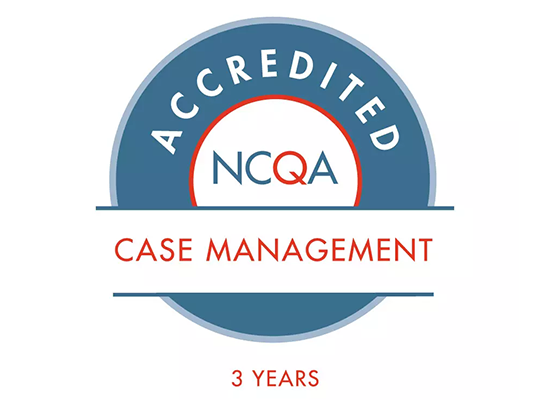
The prestigious achievement recognizes our commitment to providing the highest quality service and support to our participant families.
We are proud to share a significant milestone for our University of Illinois Chicago’s Division of Specialized Care for Children (DSCC) team.
DSCC has earned Case Management Accreditation from the National Committee for Quality Assurance (NCQA). This achievement recognizes our commitment to providing exceptional care coordination and related support to our participant families.
NCQA accreditation is widely known as a symbol of quality and shows an organization’s dedication to meeting high performance measures and continuous improvement.
“We are thrilled to receive NCQA Case Management Accreditation, which highlights the strength and person-centered focus of our care coordination services,” said DSCC Executive Director Thomas F. Jerkovitz.
“This achievement reflects the great work of our entire DSCC team to improve operations and strengthen how we partner, help and connect with families throughout the state. We hope our participant families can feel confident and empowered, knowing they have a strong support system focused on improving their quality of life.”
DSCC provides care coordination to Illinois children and youth with special healthcare needs and their families through several programs.
We tailor our care coordination to each family’s unique needs and goals. We partner with them to develop a care plan focused on a child’s medial, social, behavioral, educational and financial needs.
Our care coordination can include finding specialized medical care, helping families understand their child’s diagnosis and medical treatment plan, explaining insurance benefits and attending school meetings.
In 2021, DSCC’s leadership set a strategic goal to work toward NCQA accreditation. Our team members have worked for more than three years to achieve this major recognition.
NCQA purposely sets its accreditation standards high to encourage organizations to continuously enhance their quality. The standards aim to help organizations achieve the highest level of performance possible and create an environment of continuous improvement.
The NCQA Case Management Accreditation Program reviewed our care coordination and entire organization against the following standards:
- Program Description: The organization uses up-to-date evidence-based information to develop its case management program and regularly updates the program with relevant findings and information.
- Patient Identification and Assessment: The organization systematically identifies patients who qualify for its programs.
- Care Planning: The organization coordinates services for patients through the development of individualized care plans.
- Care Monitoring: The organization has systems in place to support case management activities and monitors individualized care plans.
- Care Transitions: The organization has a process to manage care transitions, identify problems that could cause care transitions and prevent unplanned transitions, when possible.
- Measurement and Quality Improvement: At least annually, the organization measures patient satisfaction, program effectiveness and participation rates.
- Staffing, Training and Verification: The organization defines staffing needs, provides staff with ongoing training and oversight and verifies healthcare staff credentials.
- Rights and Responsibilities: The organization communicates its commitment to the rights of patients and its expectations of patients’ responsibilities.
“Case Management Accreditation moves us closer to measuring quality across population health management initiatives,” said NCQA President Margaret E. O’Kane. “Not only does it add value to existing quality improvement efforts; it also demonstrates an organization’s commitment to the highest degree of improving the quality of their patients’ care.”
A big congratulations and thank you to everyone who helped us reach this milestone!
NCQA is a private, nonprofit organization dedicated to improving health care quality. NCQA accredits and certifies a wide range of health care organizations. It also recognizes clinicians and practices in key areas of performance. NCQA’s Healthcare Effectiveness Data and Information Set (HEDIS®) is the most widely used performance measurement tool in health care. NCQA’s website (ncqa.org) contains information to help consumers, employers and others make more-informed health care choices. NCQA can be found online at ncqa.org, on Twitter @ncqa, on Facebook at facebook.com/NCQA.org/ and on LinkedIn at linkedin.com/company/ncqa.
Important DSCC Contact Information Updates

Participant families, please save our (800) 322-3722 number to your contact list!
As part of our commitment to serving our participant families, we want to ensure you can easily reach us whenever you need help or have questions.
Please take a moment to save our toll-free (800) number to your contacts list: (800) 322-3722.
This step will help prevent our calls from being mistaken as spam. It will also help ensure you receive important updates and support from your care coordination team.
Our (800) 322-3722 number remains the simplest and fastest way to reach anyone at the Division of Specialized Care for Children (DSCC).
You can use this number to dial your Care Coordinator’s direct extension or have our Customer Service Representatives connect you with the right person or team.
Saving our number to your phone’s contact list can help improve the process in several ways:
- Have quicker access – Having our number readily available in your contacts can save time when you need assistance or have questions.
- Avoid spam filters – Saving our number reduces the likelihood our calls will be flagged as spam.
- Communicate more seamlessly – Having one number to call helps ensure smoother communication whenever you need support or would like to share feedback.
You may also reach us electronically through our general dscc@uic.edu email address or our Contact Us or Request a Callback forms on our website.
You can also use our new DSCC Family Portal to easily share information and communicate with your care coordination team. You can use the Family Portal to:
- Send messages
- Sign documents
- View important letters
- See a list of providers and much more
To access the portal, visit https://go.uic.edu/DSCCFamilyPortal.
To help you get started, we’ve created several tip sheets and videos for how to use the Family Portal. You can find these resources on our website at https://dscc.uic.edu/dscc-family-portal/.
If you have trouble accessing the Family Portal or need other support, please email dsccexternalhelp@uic.edu.
You can also speak with your Care Coordinator if you need to update your communication preferences.
Our office hours are 8 a.m. to 4:30 p.m. Please talk to your Care Coordinator if you need to speak outside of business hours.
We want to ensure our care coordination teams are easily accessible for everyone in our programs.
Thank you for your cooperation and partnership!
Home Care Region 2 Care Coordinator Earns DSCC’s Award of Merit
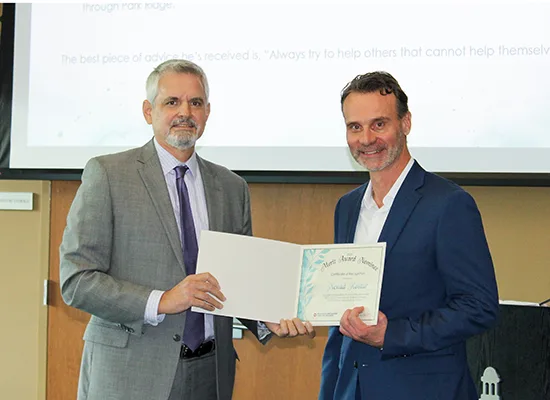
DSCC honors Ned Kostur for outstanding service to Illinois children and youth with special healthcare needs and their families
Care Coordinator Ned Kostur is the 2023 recipient of the University of Illinois Chicago’s Division of Specialized Care for Children (DSCC) Merit Award.
The award recognizes exceptional employees for outstanding dedication and service to Illinois children and youth with special healthcare needs.
“Ned is an outstanding Care Coordinator. He is a trusted mentor to his teammates and a caring and dedicated partner to the families he serves, helping meet their needs and improve the quality of their lives,” DSCC Executive Director Thomas F. Jerkovitz said.
Ned is based in our Lombard Regional Office and works for DSCC’s Home Care Region 2. As a Care Coordinator in the Home Care Program, he helps families of children and youth who need in-home nursing to safely live at home.
Many of the DSCC participants Ned works with are on the Home and Community-Based Services Waiver for Those Who are Medically Fragile Technology Dependent (commonly called the MFTD waiver). These children and youth have more complex medical needs that require a higher level of care.
Ned helps educate their families about the services and benefits of the MFTD waiver and other state programs that can help meet their needs. He also guides families through the process of modifying their homes to support their child’s medical care and equipment.
“I meet with families, which I enjoy very much. It’s just a rewarding experience to get a piece of equipment or to finally find that right nursing fit for that family and just to see the smile on the family’s face as we’re aiding them in their journey in helping their child,” Ned said. “It’s just a great organization to work for.”
Ned began his journey with DSCC in 2003. Over the last two decades, he has worked in both the Core and Home Care programs.
Ned is a “go-to” for his colleagues who describe him as caring, compassionate, considerate, and hard-working. They also love how his passion for serving our participant families shines through in all his actions.
“Ned exemplifies what great care coordination looks like and its positive impact on the families we serve,” said Terri-lynn Jones Wood, Assistant Director of Home Care Operations for Regions 2, 4 and 6.
“He has a true desire to bring families a sense of relief and understanding that they have someone on their side, someone they can trust and rely on,” Home Care Region 2 Regional Manager Mariangely Spilotro-Marquez added.
“He takes great pride in his work and ensuring that families understand Home Care, the services provided, what his role is and how he can assist them.”
Ned draws on his experience in clinical psychology, biology, treatment and discharge planning, quality assurance, teaching and more to help others. His Lombard teammates appreciate his wealth of knowledge about DSCC processes and resources, sense of humor and willingness to help in any situation.
“He has shown me what it means to be dedicated, empathetic and professional,” Program Coordinator Assistant Kimberley Firkins said. “Ned’s the perfect example of what it means to partner, help, and connect, not only with our families and providers but also within the organization, with his teams, and his co-workers.”
Learn more about Ned and his exceptional service to families in this video below:
DSCC staff nominated a total of five of their colleagues for this year’s Merit Award. As the winner, Ned receives a Merit Award memento, a $2,500 award and recognition from the Executive Director.
The other 2023 nominees are:
- Elizabeth “Liz” Bailey, Home Care Enrollment Manager, Lombard Regional Office
- Lisa Garbe, Assistant Regional Manager. Marion and Olney Regional Offices
- Mayra Rubio, Bilingual Care Coordinator, Mokena Regional Office
- Amanda Simhauser, Communications Manager, Central Administrative Office in Springfield
A big congratulations to Ned and all the 2023 nominees! We are grateful for your service and commitment to Illinois families!
DSCC Rolls Out New Tool to Better Connect With Our Participant Families
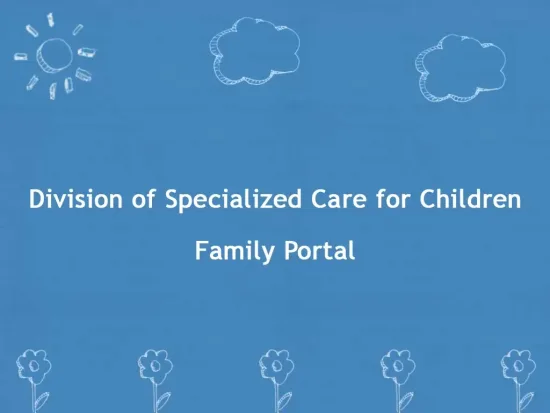
The DSCC Family Portal can help you easily communicate with your care coordination team and find the information you need
It’s important for our Division of Specialized Care for Children (DSCC) participant families to be active partners in their child’s care. We’re excited to introduce a new way for you to easily share information and communicate with your DSCC care coordination team.
Our new DSCC Family Portal aims to help you find the records you need all in one convenient place.
You can use the Family Portal to:
- Send messages
- Sign documents
- View important letters
- See a list of providers and much more
To access the portal, visit https://go.uic.edu/DSCCFamilyPortal.
To log in to the Family Portal for the first time, you will need:
- Your email address
- Your DSCC participant’s name or DSCC ID number
- A unique password
We know learning a new application can seem tough. We have tip sheets and videos to help you get started and feel comfortable using the portal. You can find these resources on our website at https://dscc.uic.edu/dscc-family-portal/.
If you have trouble accessing the Family Portal or need other support, please email dsccexternalhelp@uic.edu. A designated DSCC staff person will help you as soon as possible.
We are always looking for ways to improve our services and strengthen our support for families.
We hope the Family Portal will be an easy and convenient way for you to connect with your care coordination team and the resources you need.
DSCC Quality Specialist Honored for Service to Families in Crisis
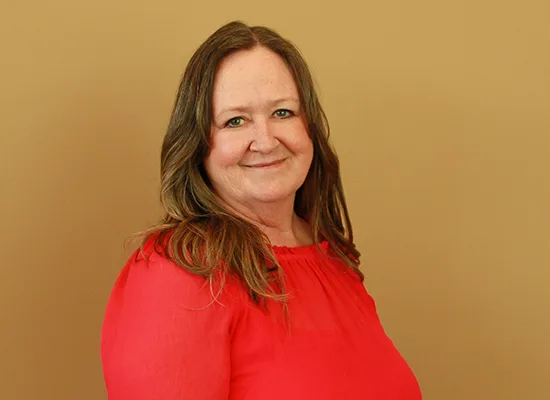
CountyCare awarded Tess Rhodes its Certificate of Excellence for her commitment and dedication
Tess Rhodes is a registered nurse on our Quality Improvement Team. She collaborates with her Division of Specialized Care for Children (DSCC) teammates and partner organizations across Illinois to make sure children in crisis have the right support.
A managed care health plan recently honored Tess for these efforts to protect the safety of children and families.
CountyCare’s Health, Safety and Welfare Team awarded Tess its Certificate of Excellence. The certificate recognizes her “tremendous commitment and dedication” to keeping County Care participants safe and meeting their families’ needs.
Tess said she couldn’t do this important work without DSCC’s care coordination teams and our partners in the community.
DSCC has a contract with CountyCare to provide care coordination to the children and youth with special healthcare needs in its Medicaid managed care health plan.
As a Core/Connect Care Quality Improvement Specialist, Tess helps DSCC’s care coordination teams when a participant enrolled in CountyCare has a critical incident.
Critical incidents are events or situations that create a significant risk of substantial or serious harm to a participant’s physical or mental health, safety or well-being. They can include:
- Abuse or neglect
- Harassment or bullying
- Death of a family member
- Significant injuries
- Medication or treatment errors
- Threat of self-harm
DSCC works with CountyCare to report these incidents and make sure our teams respond to reduce any risks for our participants and help them get the right resources and services they need.
When DSCC team members learn of a critical incident, they must report it to CountyCare within 24 hours of notification.
Tess says it’s important to first ensure that our child/youth is safe and that their family receives the right support for their situation.
Tess and the DSCC care coordination teams work alongside CountyCare staff, the child’s medical team and others to provide access to services and resources.
The DSCC Care Coordinator checks in with the family bi-weekly after a crucial incident to help and monitor the outcome. Tess assists in the process by guiding the participant’s Care Coordinator and providing more resources and materials for education.
Once CountyCare closes a critical incident, Tess continues to monitor the situation and provides final updates at the 30-, 60- and 90-day marks. She also coordinates meetings for all care team members to discuss the incident and develop a plan of support.
“This requires very detailed organizational skills, and Tess never misses an update or chance to help,” her supervisor, Quality Improvement Manager Brandon Bartels, said.
Brandon praised Tess’ “exceptional” communication with CountyCare and her collaboration to keep participants’ and families’ needs at the forefront.
“Tess has received accolades by email from their team multiple times, so this Certificate of Excellence proves not only have they valued her efforts in the past but her continued support for our participants, Care Coordinators, and relationship with CountyCare is truly making an impact,” he said.
Congratulations, Tess! We are grateful for your compassion, teamwork and commitment to children and families!
DSCC Invites Teens to Take Part in New Project to Improve Mental Health Support

The B.E.S.T. research study looks at how care coordination services that include mental health support can benefit teens with intellectual and developmental disabilities.
Adolescence can be a challenging time for teens with intellectual and developmental disabilities (IDD).
It’s not unusual to feel sad, stressed or overwhelmed.
A new research study opportunity can help teens with IDD learn how to manage these feelings and cope with times of change.
The study is called Behavioral Health Stratified Treatment (B.E.S.T.) to Optimize Transition to Adulthood for Youth With IDD.
The B.E.S.T. study wants to understand if care coordination services that include mental health programming can help teens with IDD live happier and healthier lives.
The study is available for some teens and young adults enrolled with the University of Illinois Chicago’s Division of Specialized Care for Children (DSCC). Eligible DSCC participants must be enrolled in DSCC’s Core Program or Connect Care Program. (Please note that DSCC teens enrolled in the Home Care Program are not eligible to participate.)
All DSCC participants receive care coordination services. The B.E.S.T. study looks at if it’s more beneficial for DSCC teens to receive care coordination that also includes programs to help with mood and stress.
The B.E.S.T. study is a free and voluntary project. Teens can join the study if:
- They currently have a DSCC Care Coordinator and are enrolled in DSCC’s Core or Connect Care programs.
- They are between 13 and 20 years old.
- They have an intellectual or developmental disability.
- They can comprehend at a fourth-grade or similar level.
- They can read and speak English.
- They have a computer, tablet or smartphone they can use to access the internet.
- They have permission from their parent, caregiver or guardian (if they are under 18).
More than 200 DSCC participant families have enrolled in the study as of June 2023.
“I am thankful for the B.E.S.T. program,” one parent participant shared. “It’s helping (my daughter) voice feelings. I hope the program continues for her.”
The B.E.S.T. study team developed the project with input from a group of B.E.S.T. Study Scholars. These scholars are teenagers with IDD who tested and reviewed all of the B.E.S.T. study materials.
“I loved working on the B.E.S.T. project because I got to share my experiences as a teen with a disability,” B.E.S.T. Study Scholar Erin Compton said. “Sometimes people with disabilities have health problems, but we aren’t going to let that stop us.”
Erin also praised the B.E.S.T. study team, led by Project Director Iulia Mihaila, Ph.D.
“I loved working with Iulia and the team because they respected me and all the other self-advocates on the project as leaders,” she said. “B.E.S.T. has a really good team, and I loved being a part of it.”
Erin’s mom, Diane Compton, said the project is a great opportunity to include the voices of those with disabilities.
“The B.E.S.T. team really excelled at including the voices and experiences of all who worked on the project,” she said. “It gives me such hope for the future that organizations are creating these opportunities for young people.”
Iulia said Erin and all the B.E.S.T. Study Scholars provided “immeasurable value” to the project.
“They gave us direction on how to make our work more relevant to teens with IDD and their families. Our work would not have been as strong without them,” Iulia said.
Teens who join the study will be put into one of two groups:
- Group A will receive care coordination services as usual from their DSCC Care Coordinator.
- Group B will receive care coordination services and mental health support from the B.E.S.T. team. This support is based on each teen’s needs and can include:
- Mental health education
- Online group sessions
- Caregiver education and support
The study is a virtual program and should last for two years.
The B.E.S.T. study is a partnership between DSCC and the University of Illinois Hospital and Health Sciences System (UI Health), the University of Illinois Chicago’s (UIC) Department of Disability and Human Development and the UIC Department of Pediatrics.
The principal investigators are Dr. Benjamin Van Voorhees and Dr. Kristin Berg.
The B.E.S.T. study team includes mental health professionals from Illinois, California and Massachusetts. They are all working together to find a way to promote the health and well-being of teens with IDD.
You can learn more information for both teens and parents/caregivers on the B.E.S.T. study website.
If you would like to join the study or have questions, please email the B.E.S.T. study team at beststudy@uic.edu or call (833) 732-5778.
If you choose to join, you and your family can support research that helps other teens and families.
Teens will have the opportunity to learn helpful coping skills for their moods and emotions. Parents and caregivers can gain information on how to support their teens.
Both parents/caregivers and teens must agree to be in the study. (Note that if a teen is their own legal guardian, they can participate alone or with a parent/caregiver if they choose.)
Those who join will be compensated for their time.
We’re excited to be a part of this important research project!
DSCC Partners with Fowler Bonan Foundation to Offer Back-to-School Shopping Spree for Family in Need
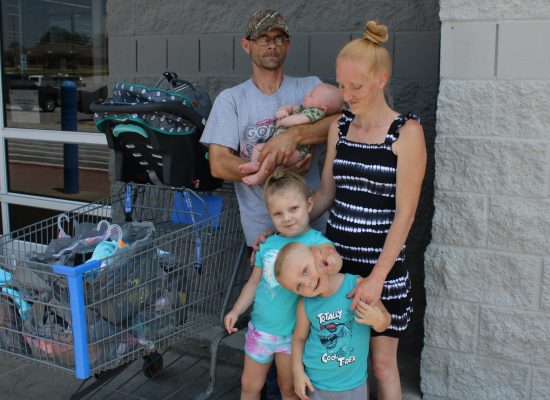
Fowler Bonan Foundation, a southern Illinois nonprofit, worked with DSCC’s Marion Regional Office to provide shoes and clothing for participant Renesmae and her two younger siblings
Renesmae is an outgoing 5-year-old who loves unicorns. She recently started kindergarten with extra sass and confidence thanks to new unicorn outfits and orthotic shoes for the school year.
Renesmae and her two younger siblings received a free back-to-school shopping spree for these much-needed items and more from the Fowler Bonan Foundation.
Renesmae’s care coordination team from the University of Illinois Chicago’s Division of Specialized Care for Children (DSCC) partnered with the foundation to make the special shopping trip possible,
“There’s a lot going on. With the kids starting school, we just didn’t know what we were going to do,” her mother, Misty, said during the shopping trip.
“Everyone at DSCC is really nice. They help with rides to the doctors and other things, but we never expected this. I can’t believe we’re shopping! It’s just above and beyond.”
A family in need
Renesmae has been a DSCC participant for most of her life.
“She had viral meningitis and severe seizures when she was 2 months old,” Misty said. “She has partial paralysis on her right side, can’t open her right hand on command or raise that arm very high, and limps or drags her foot when she walks. Thankfully, she hasn’t had any seizures in a while.”
Renesmae also has hypertonia, which makes her muscles stiff and difficult to move, and homonymous hemianopsia, a condition that causes her to see only one side of the visual field of each eye.
Misty describes Renesmae as “outgoing and not one bit shy.”
“She’s my absolute handful and, like the country song says, can be ‘t-r-o-u-b-l-e,’” she said. “She’s also a great big sister and is always doing stuff for her little brothers. She’s such a mother hen to Liam and Aries.”
Liam is an infant, and Aries is 3. Aries is now starting Head Start, a program that promotes school readiness.
Renesmae’s DSCC care coordination team includes Care Coordinator Cheryl Golliher and Program Coordinator Assistant Renee Woodson. They partner with Renesmae’s family to find treatment options, transportation to appointments and other services to help Renesmae thrive.
“The family let me know they needed help getting her orthotic shoes,” Cheryl said. “Renesmae wants to be like every other kid. The shoes look like any other pair of shoes but are different sizes and fit her brace. The shoes are an important part of keeping her focused on positive things, not other distractions.”
As Cheryl and Renee looked for options for Renesmae’s footwear, they learned all three siblings needed new clothes and shoes for the school year.
A local nonprofit ready to help
Our DSCC care coordination teams can help our participant families find community funding opportunities and resources to meet these important needs.
Amy Jones, DSCC Regional Manager for our Olney and Marion offices, and her team contacted the Fowler Bonan Foundation to see if they could help Renesmae’s family. The foundation provides clothing and shoes to low-income children through their Clothes for Southern Illinois Kids initiative.
“They agreed to help buy clothes and shoes for all of the children and asked that we join their volunteers to help the family shop,” Amy said. “We contacted the family and worked with the foundation and our team to get everything set.”
Bobbie Fox is a Fowler Bonan board member who began volunteering with the organization nearly two decades ago.
“My family was new to the area, and I worked as a store manager. Back then I did all the shopping for our families on my lunch break,” Bobbie explained. “Now, more people know about us and that we offer help in 17 counties throughout southern Illinois. We work with local organizations, community businesses, teachers and others to fundraise and make sure that every bit goes out locally to reach our families and help kids.”
Time to shop
Everyone met at Walmart in Anna on July 20 for the shopping trip. The group included Renesmae’s family – her parents, Misty and Jerry, and little brothers, Liam and Aries – and Bobbie from the foundation and her daughter, Saylor.
Cheryl and Renee were unable to attend. Their teammate Jimmy Baldi, a DSCC Program Coordinator Assistant from the Marion office, volunteered to join the group and help shop.
The first stop was the shoe department. Mom and dad located the right sizes, but the kids had a tough time deciding with so many options to choose from. Renesmae selected Minnie Mouse sandals. Aries went with the Batman sneakers.
“We want to be sure that the kids have shoes and other essentials, such as socks and underwear, in addition to everyday clothes,” Bobbie explained. “The foundation typically provides $100 to $150 for each child to cover these needs.”
A team effort and “win-win for all”
Everyone did their part to help Misty and Jerry feel comfortable and find items the kids needed.
The group took turns hunting for unicorns and superheroes (Aries’ favorite), suggesting styles and finding the right sizes.
Everyone’s efforts were worth it. At the checkout, the kids were happy campers and Misty couldn’t believe they each had five new outfits for school along with plenty of underwear and socks.
Jimmy even snuck in some baby time with Liam.
“I’m really amazed and just so thankful to the foundation and everyone,” Misty said. “These will be hidden away until school starts so that they don’t get messed up.”
As the shopping trip ended, Bobbie exchanged high fives with Renesmae and got a big hug from Aries.
“It’s such a joy to be able to do this,” Bobbie said. “The focus on the kids, partnering with other organizations and individuals. It’s a team effort and a win-win for all.”
The Fowler Bonan Foundation also ordered Renesmae’s orthotic shoes. Jimmy later traveled to the foundation’s headquarters in Harrisburg to pick them up. Cheryl delivered the shoes to the family.
What started as a team effort, ended as a team effort.
“The Foundation is a great resource and so quick to respond to the needs of our families,” said Cheryl. “The shopping trip helped relieve so much stress and worry for the family. It was a great team effort in every sense of the word. I hated to miss the shopping trip, but Jimmy volunteered to go and really loved going.”
We’re thrilled our Marion Regional Office team and the Fowler Bonan Foundation came together to support Renesmae’s family. A big thank you to Fowler Bonan for providing the generous shopping spree!
If you would like to volunteer to help the foundation or know of a family or child in need, please contact them at FowlerBonanFoundation@gmail.com.
You can see more photos from the shopping trip on our Facebook page.
Strategies to Empower Family Caregivers
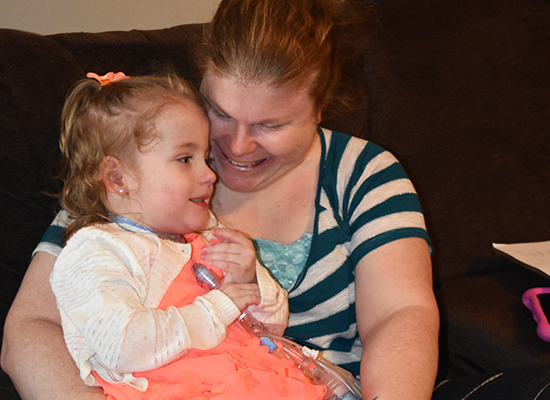
DSCC provides support and resources to strengthen caregivers’ ability to care for themselves and children with special healthcare needs.
November is National Family Caregivers Month. It’s an opportunity to celebrate all of you who selflessly and continuously care for your children and loved ones with special healthcare needs.
At the University of Illinois Chicago’s Division of Specialized Care for Children (DSCC), we recognize the huge role you play in your child’s overall health and wellbeing. We value our partnership with parents and caregivers to help set goals for your child, identify strengths and make plans to achieve what is important to your family.
We also understand the importance of caregiver health and providing you the right support and resources. DSCC is dedicated to empowering caregivers and strengthening your ability to provide care for someone else.
We recognize how you are there every day, managing multiple care needs and navigating complex healthcare systems, insurance systems and more. Our priority is to help strengthen your knowledge, reduce your stress and help you feel more confident and organized in your child’s care.
Here are three significant ways we aim to empower caregivers:
- Partner with you to identify what you, your child and your family need. As the parent or caregiver, you know your family’s unique needs and values better than anyone. We listen to these needs and partner with you to identify your child and family’s goals and how to accomplish them. If you are not enrolled in our program or need help knowing how to identify your needs, this quick self-assessment tool can help.
- Help you brainstorm and connect with others. Conversations around health allow all of us to get creative, see things differently and develop new ways of doing things. These creative ways can save you time, energy or allow for improved interactions. Some connections in the community are your primary health or behavioral treatment specialist, other DSCC parents or a community parent support group.
- Connect you to the latest research and information. As growing research helps us better understand physical and mental health, it can also show new techniques, interventions and treatment options. Think about how you learn best and reach out to trusted sources. Our staff can help you find the best sources of information. We are also experts on local resources and supports available in your community.
The physical and emotional demands of caring for a child with special healthcare needs are 24/7. Though we can’t take away all the worries and emotions, we can provide a consistent helping hand to support you through your child’s journey with a medical condition
To learn more about our care coordination, visit our How We Help page. You can also contact your local DSCC Regional Office or call us at (800) 322-3722.
Our online Resource Directory also includes resources and tips for caregivers.
Featured resources include:
- Caregiver Action Network’s Family Caregiver Toolbox
- The National Alliance on Mental Illness’ Self-Care for Caregivers
- Family Caregiver Mental Health and COVID-19
- National Caregivers Library
- Preparations for Caregivers During COVID-19 and Beyond
- Emotional Well-Being Toolkit: Resources for Children, Families and Caregivers
- National Respite Locator
- Easterseals Respite Services for People With Disabilities
- Apps for Caregivers
- Self-Care and Emotional Wellness Apps
- Coloring Pages for Caregivers




